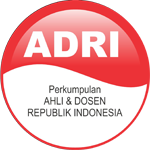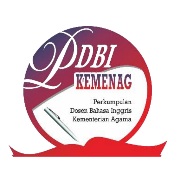Challenges Faced by English Teachers in Indragiri Hulu Regency in Teaching Speaking Through Online Platform
Abstract
The research aims to investigate the English teacher's challenges in teaching speaking through the online platform when the preparing lesson plan, while the teaching performing, and when the evaluating. This research employed a mixed-method sequential explanatory strategy to reveal the data-oriented to the aforementioned focuses. Fifty-two English teachers engaged as the correspondent of the questionnaire while thirteen English teachers were selected as the participant in the interview. They were selected based on the purposive sampling technique and taken from Senior High Schools in Indragiri Hulu Regency. To gather the data, the questionnaire and interview were deployed and were further analyzed by using the interactive model data analysis. The findings demonstrate that the majority of English teachers had a negative category in teaching speaking through online platforms with an average of total score 122. The challenges when preparing the lesson plan covered four aspects: prepare teaching materials, activity, media, and prepare evaluation materials. Subsequently, the challenges when preparing the lesson plan are the teachers should have not prepared online-based learning media, searched for online speaking topics, and searched for additional teaching materials. Moreover, the lack of internet quota and connection made the students got difficulty joining classes online. In turn, while the teaching performance is teachers difficulty in coping with students' behavior, difficulty in motivating students, and giving example topics on speaking online. Furthermore, in evaluating the teacher's challenges difficulty in assessing student assignments because at the time of online learning students there were only a few students who responded to the teacher. Further studies are expected to seek possible solutions regarding the challenges faced by the teachers in teaching speaking online.
Keywords
Full Text:
PDFReferences
Act of republic Indonesia about national education system no. 20/2003. (2003). President of Republic Indonesia.
Ahmed, M. K. (2018). Pedagogy in Speaking: Challenges Addressed by TeacherStudent in the ESL Context. International Journal of Applied Linguistics and English Literature, 7(3), 97. https://doi.org/10.7575/aiac.ijalel.v.7n.3p.97
Aleksandrzak, M. (2011). Problems and challenges in teaching and learning speaking at an advanced level. Glottodidactica. An International Journal of Applied Linguistics, Vol. 37, pp. 37–48. https://doi.org/10.14746/gl.2011.37.3
Alshare, K.A., Freeze, R.D., Lane, P. L., & Wen, H. J. (2011). The impacts of the system and human factors on online learning systems use and. Decision Sciences Journal of Innovative Education, 9(3), 437 – 461. https://doi.org/10.1111/j.1540-4609.2011.00321.
Ally, M. (2004). Foundations of educational theory for online learning. In Felloumi and T Anderson (eds). Online learning handbook. Athabasca University, 3-32
Amininik, S. Amami. S. Jabalpur. S, Azodi. P (2000). Survey of the relation between lesson plan qualities with student views about Bushehr University of Medical Sciences faculty members. The journal of Medical School, fourth national conference on medical education Tehran Iran, 2000:84
Ananda,Rusydi. (2019). Perencanaan Pembelajaran. Medan: Penerbit Lembaga Peduli Pengembangan Pendidikan Indonesia (LPPPI)
Anugrah, P.M. (2021). Analysis of Teachers’ Challenges in Teaching Speaking Through Online Learning during Covid – 19 Pandemic in SMAN 2 Abiansemal. Journal of Educational Study, 1(2), 26-36. https://doi.org/10.366663/joes.v1i2.183
Arifin, Z.(2009) Evaluasi Pembelajaran. Bandung: PT Remaja Rosdakarya Arikunto, S. (2010). Prosedur penelitian suatu pendekatan praktek. Rineka Cipta.
Arikunto,S. (2013). Dasar -dasar evaluasi pendidikan. Jakarta: Bumi Aksara
Bailey, K.M. (2005). Practical English language teaching speaking. Hill Companies
Bahri,S, dan Zain, A.(2010). Strategi Belajar Mengajar .Jakarta:Rineka Cipta
Baron, R.A., & Branscombe, N.R. (2012). Social psychology (13th ed.). Pearson Education.
Brown, H.D. (2001). Teaching by Principles: An Interactive Approach to Language Pedagogy 2nd Edition. New York: Addison Wesley Longman, Inc.
Brown, H.D. (2004). Language Assessment Principles and Classroom Practices. New York: Longman.
Cole, R. A. (2020). Issues in web-based pedagogy: A critical primer.
Greenwood Press.
Creswell, J.W., & Creswell, J.D. (2017). Research design: qualitative, quantitative, and mixed methods approach (3rd ed). Sage publications.
Creswell, J.W.,& Plano C, V.L. (2011). Designing and conducting Mixed Methods Research (2nd ed). Sage Publication Ltd.
Cronbach, L. J. (2015). Coefficient alpha and the internal structure of tests. Psychometrika, 16 (3), 297 – 334.
Dornyei, Z. (2015). Research methods in applied linguistics. Oxford University Press
Fraenkell, J.R., Wallen, N.E., & Hyun, H.H.(2012). How to design and evaluate research in education. McGraw-Hill Companies. Inc. https://doi.org/10.1017/CB09781107415324.004
Garrison, D. R., Anderson, T., & Archer, W. (1999). Critical Inquiry in a Text-Based Environment: Computer Conferencing in Higher Education. Internet and Higher Education, 2(2–3), 87–105. https://doi.org/10.1016/S1096-7516(00)00016-6
Hamalik, O. (2014). Teaching and learning process. Jakarta: Bumi Aksara. Harri, D. (1974). Testing English as a Second Language. New York: Mc. Graw. Hill Book Company.
Heaton, J, B. 1978. The Components of Speaking Ability. Retrieved November 12, 2013 from http://beddebahhaterulez.blogspot.com/2012/08/the-components-of -speaking ability.html.
Huang, C., Wang, Y., Li, X., Ren, L., Zhao, J., Hu., Y., Zhang, L., Fan, G., Xu, J., and Gu, X.(2020). Clinical Features of Patients Infected with 2019 Novel Coronavirus in Wuhan China, "The Lancet (395:10223.Elsevier, pp.497-506
Irawan, R. (2020). Exploring the Strengths and Weaknesses of Teaching Speaking by Using LMS-Edmodo. ELTICS : Journal of English Language Teaching and English Linguistics, 5(1). https://doi.org/10.31316/eltics.v5i1.528
Jensen, L. (2001). Planning Lessons. In M. Celce-Murcia (Ed), Teaching English as a Second or Foreign Language. Retrieved on September 26th, 2013. Form: https://www.princeton.edu/~pia/TEFL.pdf
Kementrian Pendidikan dan Kebudayaan Republik Indonesia (2020). Surat edaran no. 4 tahun 2020 tentang pelaksanaan kebijakan pendidikan dalam masa darurat penyebaran corona virus disease (covid – 19).
Kitao, K., & Kitao, S.K. (1997). Selecting and developing teaching/learningmaterials. Retrieved from http://iteslj.org/Articles/Kitao-Materials.html
Kizlik, B. (2004). Five Common Mistakes in writing lesson plans. Retrieved from http://www.educationoasis.com
Majid, A. 2014. Pembelajaran Tematik Terpadu. Bandung: PT Remaja Rosdakarya
Majid, A. (2005). Perencanaan Pembelajaran, Mengembangkan Standar Kompetensi Guru. Bandung: Remaja Rosdakarya
Miles, M. B., Huberman, A. M., & Saldana, J. (2014). Qualitative data analysis: a methods sourcebook. SAGE Publications, Inc.
Morse, J.M. (1991). Approaches to qualitative-quantitative methodological triangulation. Nursing Research, 40(1), 120-123
Murphy, K.R.& Davidshofer, C.O. (2001) Psychological testing. Prentice-Hall
Nunan, D. (2005). Practical English Language Teaching. Boston: McGraw-Hill.
Nuranda, I. (2018). The Use of Role Play Technique To Improve Students’ Speaking Ability At Grade X Of Senior High School. Journal of English Language and Language Teaching, 3(2), 89–94. Retrieved fromhttp://journal.stainkudus.ac.id/index.php/equilibrium/article/view/1268/1127%0Ahttp://publicacoes.cardiol.br/portal/ijcs/portugues/2018/v3103/pdf/3103009.pdf%0Ahttp://www.scielo.org.co/scielo.php?script=sci_arttext&pid=S0121-75772018000200067&lng=en&tlng=en
Paneerselvam, A., & Mohamad,M. (2019). Learners’ Challenges and English Educators’ Approaches in Teaching Speaking Skills in an ESL Classroom: A Literature Review. Creative Education, 10(13) 3299-3305. https://doi.org/10.4236/ce.2019.1013253
Rerung, M. K. T. (2018). Students’ Perception on Blended Learning in English Listening and Speaking Class. Journal of English Language and Culture, 9(1), 17– 28. https://doi.org/10.30813/jelc.v9i1.1449
Rodrigues, P. D., & Vethamani, M. E. (2015). The Impact of Online Learning in the Development of Speaking Skills. Journal of Interdisciplinary Research in Education, 5(1), 2232–180.
Roxby, P. (2020, March 11). Coronavirus was confirmed as a pandemic by the world health organization. BBC News. https://www.nnc.com/news/world-51839944.html/
Sagala, S (2005). Manajemen Berbasis Madrasah, dan Masyarakat Strategi Memenangkan Persaingan Mutu: Nimas Multima
Sanjaya, W. (2013). Perencanaan dan desain sistem pembelajaran. Jakarta: Kencana Prenada Media Group
Sardiman. (2012). Teaching and learning interaction & motivation. Jakarta: Rajawali Pers.
Setyawan, C. (2020). Challenges on Teaching Online English Subject in SMK Negeri Nawangan. English Educational Jurnal, 21(1), 1-9
Siemens, G., Onderwijsdagen, S., Age, D., Design, E., Downes, S., & Verhagen, P. (2005). Connectivism: a new learning theory? Journal of Instructional Technology and Distance Learning, 2(1), 1–5. Retrieved from http://elearning.surf.nl/e-learning/English/3793
Spratt, M., Pulverness, A., & Williams, M. 2005. The Teaching Knowledge Test (TKT) Course. Cambridge University Press.
Sudjana, N. (2010). Penilaian Hasil Proses Belajar Mengajar. Bandung: Remaja Rosdakarya
Sun, A., & Chen, X. (2016). Online education and its effective practice: A research review. Journal of Information Technology Education: Research, 15(2016), 157– 190. https://doi.org/10.28945/3502
Suryadi, R.A., & Mushlih, A. (2019). Desain dan perencanaan pembelajaran. Yogyakarta: Deepublish
The Teaching Excellence in Adult Literacy. (2010). Effective Lesson planning. Unite States: U.S Department of Education
Yamin, M. (2013). New learning paradigm. Jakarta: Referensi
Yildrim, A. (2003). Instructional planning in a centralized school system: Lessons of a study among primary school teachers in Turkey. International Review of Education, 49(5), Pp: 523-543
Yunita, W. (2004). The non – English major students’ attitude to the teaching of English subject at university Bengkulu. Unpublished Thesis. Universitas Bengkulu
Yusuf, Q., & Zuraini (2016). 1st English Education International Conference (EEIC). Teacher’S Efforts to Overcome Students’ Difficulties in Reading Comprehension, 542-546
Zein, M & Darto. (2012). Evaluasi Pembelajaran Matematik. Pekan baru: Daulat Riau
DOI: http://dx.doi.org/10.29240/ef.v6i1.4106
Refbacks
- There are currently no refbacks.
Copyright (c) 2022 Stevani Likasari Tarigan

This work is licensed under a Creative Commons Attribution-NonCommercial-ShareAlike 4.0 International License.
INDEXED BY:
 This work is licensed under a Creative Commons Attribution-NonCommercial-ShareAlike 4.0 International License
This work is licensed under a Creative Commons Attribution-NonCommercial-ShareAlike 4.0 International License
@ ENGLISH FRANCA : Academic Journal of English Language and Education
Jl. Dr. AK Gani No 1 Dusun Curup, Rejang Lebong Regency, Bengkulu Province, Indonesia, 39119.
Dr. Eka Apriani, M.Pd., email: efranca@iaincurup.ac.id, eka.apriani@iaincurup.ac.id.




.png)












